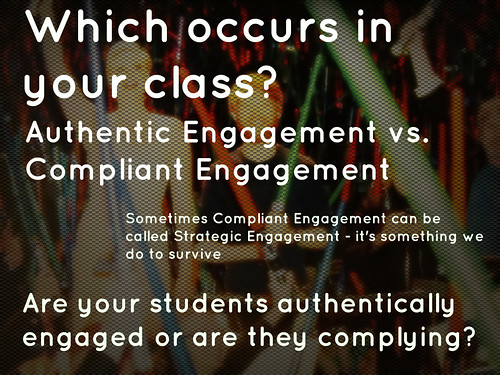Dear all,
Hope you are all having a good weekend. This morning I feel that a haze has at last been lifted from inside my head and that I am truly back in HCMC.

Ken Whytock Flickr via Compfight cc
Just wanted to share this train of thought because it is useful for defining how we approach one of the three key pillars of our mission and also a section of our walk through data. The question compliant or engaged is particularly important when put into context of schools preparing students for the 21st century and their future. The work of Yong Zhao clearly identifies that one of the most important changes that has taken place in the our modern world and that education needs to address is that there is a declining demand for compliant employees as technology can easily replace these workers. What has emerged is a world where students need to be creative, innovative, flexible, problem solvers and life long learners who are prepared to be entrepreneurs and employers in the future. The importance of having engaged as part of our mission is that without this characteristic students aren't embedding their learning and understanding and able to utilize this to develop new thoughts. However, as this article from Mindshift points out there is more to being engaged that sitting in class quietly and getting on with a task. There is a lot to learn for all of us from this article, at all levels in our school about how we develop our classroom practice to further embrace our mission.
“Everything we know about the neuroscience of learning is that emotion drives cognition,” he said. But even if a student is behaving and feels good about it, if he or she isn’t actively making meaning out of the information, then active engagement still hasn’t been reached.
When Almarode visits classrooms he looks for eight different qualities that indicate students are engaged.
1. Does the activity, strategy, task, or idea allow for the student to personalize his or her response? Can they bring their life experiences into the activity and make it their own?
2. Are there clear and modeled expectations?
3. Is there a sense of audience above and beyond the teacher and the test? Does the activity have value to someone else?
4. Is there social interaction? Do students have an opportunity to talk about the learning and interact?
5. Is there a culture of emotional safety? Are mistakes valued because they are an opportunity to learn?
6. Do students have opportunities to choose within the activity?
7. Is it an authentic activity? This doesn’t mean it always must connect directly to the student’s world, but it should connect to reality.
8. Is the task new and novel? If kids are bored, it’s hard to see engagement
To complete this week's Food for Thought is a short 8 minute TED that might provoke additional thinking and links student engagement with teacher magic. When you watch it, it could easily be dismissed as irrelevant to our context as it is about urban schools in the USA. However, haven't you ever wondered why you see teachers teaching the same content, using the same pedagogy and yet the outcome for students is different. I have heard administrators in the past call this the ' je ne sais quoi' quotient that some teachers have and others do not. What makes this TED's conclusion interesting is that this teacher trainer believes that by getting to know what makes our students tick and their cultures, ie knowing who they are, then all of us can engage our students equally as well.
And finally wanted to share something different that links with our study of positive emotions and our reflection on compassion. I was reading some of the thoughts of the Dalai Lama over the vacation and came across this passage. I think it has a great deal of relevance to our thinking about how we redefine education and the school experience:
"Our modern educational system fails to provide sufficient education about compassion. The time has come to transform this whole system. Society is formed through its educational system, but the educational system does not transmit the deeper human values of compassion and kindness. Then all of society lives with this false view that leads to a superficial life, in which we live like machines that don’t need affection. We become part of that. We become like machines. That is because today’s society is based on money. A society that is based on money is aggressive, and those with power can bully and behave cruelly to others. This situation produces growing social unrest. A society that depends on money has problems that reflect its beliefs.
In reality, affection and compassion have no direct link with money. They cannot create money. Therefore, in a society in which money is the priority, people don’t take these values seriously anymore. People in positions of leadership, like politicians, have emerged from within a society that depends on money, so naturally they think like that and lead society further in that direction. In this kind of society, people who value affection and compassion are treated like fools, while those whose priority is making money become more and more arrogant."
Have a good Sunday,
Yours
Adrian



